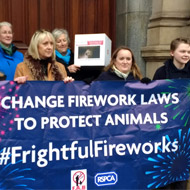
Petition backed by one-third of a million people
A petition calling on the UK government to restrict the use of fireworks has been delivered to the Office for Product Safety and Standards (OPSS).
Signed by 358,000 people, the petition calls for an urgent review into the existing, outdated fireworks regulations. It comes weeks after the OPSS said it has ‘no plans’ to review the existing regulation, despite clear widespread public concern.
“Another year and more animals are needlessly suffering despite repeated calls to the UK Government to end this madness,” said Julie Doorne from FAB Firework Abatement UK, who set up the petition. “This petition highlights the strength of feeling around this important issue and that there is widespread public support for regulations to be changed.”
Besides one-third of a million people signing the petition, some 7,000 people have also backed the RSPCA’s call to email the Government to act on changing firework regulations.
“We want to see the UK Government listening to people and strengthening the existing law and restricting the use of fireworks to traditional days of the year like bonfire night,” said RSPCA campaign manager Holly Barber, who delivered the petition with Julie Doome.
“This year - just like in previous years - our emergency line has been inundated with hundreds of calls from pet owners concerned about their terrified animals during the fireworks. This is totally avoidable, and the UK Government need to step up and act to prevent any further animal suffering.”
The RSPCA would like the private use of fireworks to be restricted on all but four days of the year; Diwali, November 5, New Year’s Eve and Chinese New Year. It would also like the maximum permitted noise level of fireworks for public sale reduced from 120 decibels - above the human pain threshold for noise - to 97 decibels.
A Westminster Hall debate on Monday 26 November will take place on Monday (26 November) where it is hoped MPs will echo public sentiment for an urgent review.
Image (C) RSPCA.



 The Veterinary Medicines Directorate (VMD) is inviting applications from veterinary students to attend a one-week extramural studies (EMS) placement in July 2026.
The Veterinary Medicines Directorate (VMD) is inviting applications from veterinary students to attend a one-week extramural studies (EMS) placement in July 2026.